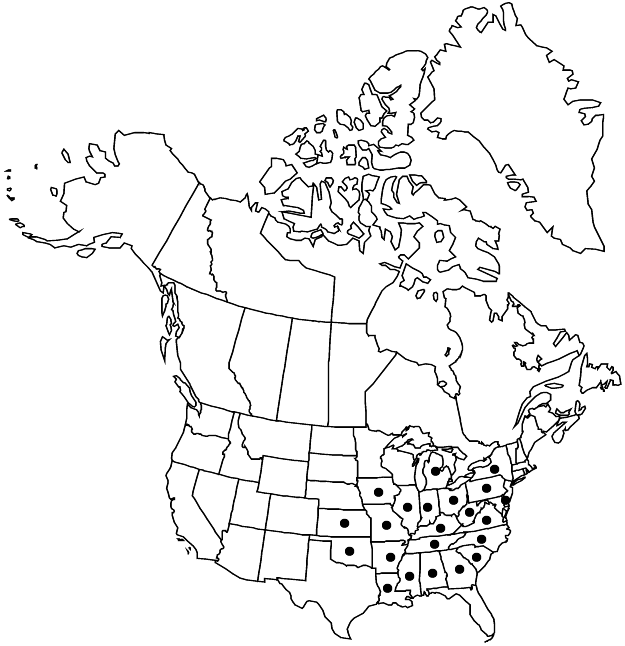Difference between revisions of "Silene virginica"
Sp. Pl. 1: 419. 1753.
FNA>Volume Importer |
imported>Volume Importer |
||
| (One intermediate revision by one other user not shown) | |||
| Line 8: | Line 8: | ||
}} | }} | ||
|common_names=Fire pink | |common_names=Fire pink | ||
| + | |special_status={{Treatment/ID/Special_status | ||
| + | |code=E | ||
| + | |label=Endemic | ||
| + | }} | ||
|basionyms= | |basionyms= | ||
|synonyms={{Treatment/ID/Synonym | |synonyms={{Treatment/ID/Synonym | ||
| Line 66: | Line 70: | ||
|publication title=Sp. Pl. | |publication title=Sp. Pl. | ||
|publication year=1753 | |publication year=1753 | ||
| − | |special status= | + | |special status=Endemic |
| − | |source xml=https:// | + | |source xml=https://bitbucket.org/aafc-mbb/fna-data-curation/src/2e0870ddd59836b60bcf96646a41e87ea5a5943a/coarse_grained_fna_xml/V5/V5_433.xml |
|subfamily=Caryophyllaceae subfam. Caryophylloideae | |subfamily=Caryophyllaceae subfam. Caryophylloideae | ||
|genus=Silene | |genus=Silene | ||
Latest revision as of 22:11, 5 November 2020
Plants perennial; taproot slender; caudex decumbent, branched, producing tufts of leaves and erect flowering shoots. Stems simple proximal to inflorescence, 20–80 cm, glandular-pubescent, often subglabrous near base. Leaves: basal numerous, tufted, petiolate, petiole ciliate, blade oblanceolate, 3–10 cm × 8–18 mm, base spatulate, apex acute to obtuse, glabrous on both surfaces, rarely puberulent; cauline in 2–4 pairs, broadly petiolate to sessile, reduced distally, blade oblanceolate to narrowly elliptic or lanceolate, 1–10(–30) cm × 4–16(–30) mm, margins ciliate, apex acute, shortly acuminate, glabrous. Inflorescences open, with ascending, often elongate branches, (3–)7–11(–20)-flowered, bracteate, glandular-pubescent, often densely so, viscid; bracts leaflike, lanceolate, 4–40 mm. Pedicels erect in flower, sharply deflexed at base in fruit, 1/2–1 times length of calyx. Flowers: calyx green to purple, 10-veined, tubular to narrowly obconic in flower, 16–22 × 5–6 mm, clavate and swelling to 7–12 mm in fruit, glandular-pubescent, lobes lanceolate to oblong, 3–4 mm, margins usually narrow, membranous, apex acute or obtuse; corolla scarlet, 2 times longer than calyx, clawed, claw ciliate, gradually widening into limb, longer than calyx, limb obtriangular to oblong, deeply 2-lobed with 2 small lateral teeth, 10–14 mm, glabrous or nearly so, appendages 2, tubular, 3 mm; stamens exserted, shorter than petals; styles 3(–4), equaling stamens. Capsules ovoid, equaling calyx, opening by 3 (or 4) teeth that sometimes split into 6 (or 8); carpophore 2–3(–4) mm. Seeds ash gray, reniform, 1.5 mm, with large inflated papillae. 2n = 48.
Phenology: Flowering spring.
Habitat: Deciduous woodlands, bluffs, moist wooded slopes
Elevation: 200-1300 m
Distribution

Ala., Ark., Del., Ga., Ill., Ind., Iowa, Kans., Ky., La., Mich., Miss., Mo., N.Y., N.C., Ohio, Okla., Pa., S.C., Tenn., Va., W.Va.
Discussion
Silene virginica is related to the scarlet-flowered species from the southwest, S. laciniata and S. subciliata. It makes a beautiful garden plant in semishaded locations. J. A. Steyermark (1963) recorded the occurrence of a hybrid between S. virginica and S. caroliniana subsp. wherryi in Shannon County, Missouri. Reports of the occurrence of S. virginica in Ontario are based on a collection (CAN, K) made in 1873 from “islands in the Detroit River” in “Canada West.”
Selected References
None.